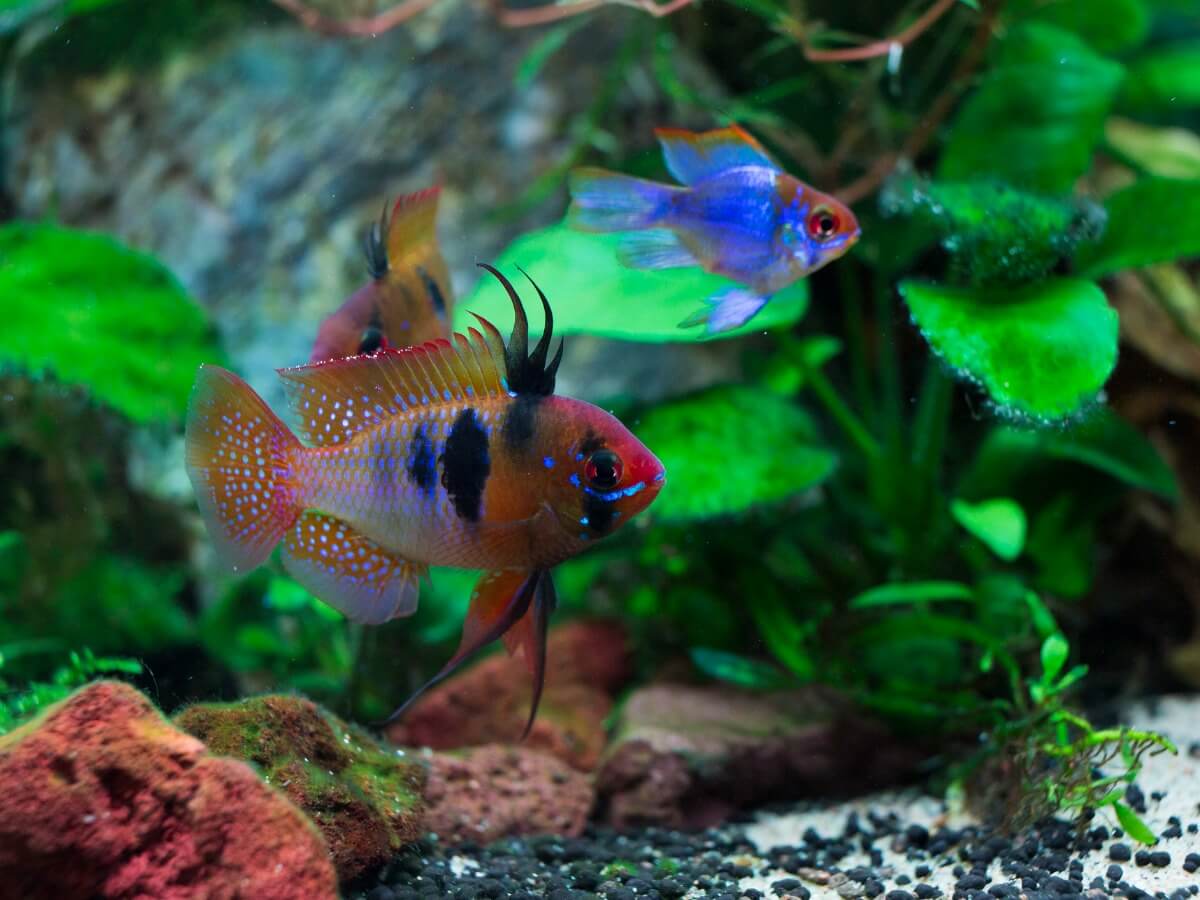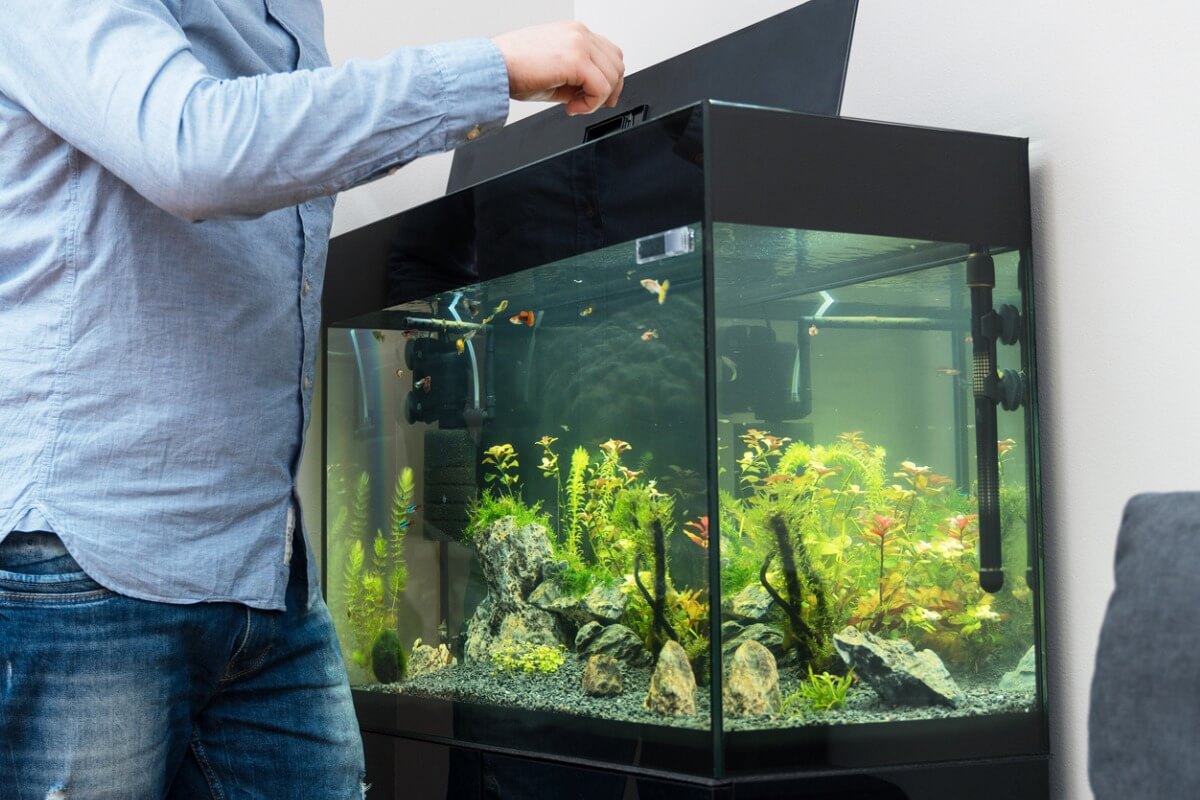How to Care for Your Aquarium in Winter


Written and verified by the psychologist Sara González Juárez
Fish, even if they live in captivity, are also affected by environmental conditions, so it’s necessary to know how to provide adequate care for your aquarium in winter. Without them, the health of your animals will be in jeopardy.
Fish are animals that depend largely on the conditions of the water they live in, because it’s what they breathe, where they eat, and where they excrete. So, here we’ll bring you some tips to get them through the cold season without them even knowing that we humans are wearing scarves and thick coats. Don’t miss it!
Fish and their thermal regulation

For mammals like us, endotherms, and with so many strategies to protect ourselves from the elements, winter is usually a much more bearable season than for animals like fish. They, in fact, are ectotherms, which means that their body temperature is regulated by the environment.
In addition, we must take into account that they are animals that have been taken from their environment, to which they have adapted in a specific way. If these conditions aren’t reliably reproduced in captivity, the health of the fish will suffer.
Fish are poikilotherms, i.e. their metabolism produces body heat, but this is too little to not depend on the environment to achieve homeostasis.
Therefore, to regulate their temperature, fish make behavioral adjustments such as moving closer to the surface to receive heat from the sun or seeking cool currents. Some cold water species have chemical mechanisms that lower the freezing point (acting as a type of antifreeze).
Looking after your aquarium in winter
When temperatures begin to drop, aquarium routines and care must change. To do so, take into account this series of factors that you need to take care of.
1. The location of the aquarium
You may have to move the aquarium when winter arrives. Drafts, a lack of light, or rooms that get cold easily are not suitable to place your scaly friends.
2. Water temperature
Another aspect of looking after your aquarium in winter is, of course, to control the water temperature. A heater and a thermometer are essential devices to achieve a stable temperature at any time of the year.
3. Aquarium care in winter: water quality
The chemicals and microorganisms present in the water are not the same in summer as in winter. Therefore, don’t forget to carry out regular water quality checks to make adjustments in care, cleaning and so on.
4. Amount of natural light
In winter, the days have fewer daylight hours, so you will have to move the aquarium to a brighter location or compensate with artificial lighting. Fluorescent and LED lights are most commonly used.
5. Winter food
Fish also need a minimum of body fat to protect them from the cold. Therefore, it’s necessary to provide extra calories and protein from autumn onwards, so that they approach the winter season with a little more weight. In addition, some fish find it hard to get used to different ways of feeding, so this should be done gradually.
6. Essential aquarium care in winter and cleaning
It may seem that the water stays cleaner longer in winter, as certain microorganisms take longer to proliferate without ambient heat. However, this aspect should never be neglected. Remember that fish living in a space as small as a fish tank are breathing their own feces and other waste.
Don’t abandon your cleaning routines. And, of course, get a good filter to help you keep the water in good condition.
7. A visual check
With so many measuring devices, sometimes you forget something very simple: to watch your fish. When they feel cold, the most normal thing is to find them at the bottom of the tank and not moving too much. This, together with other symptoms such as the appearance of white spots on their scales or signs of stress (accelerated breathing, change in feeding patterns, etc.), will indicate that something is wrong with their health.
Winter tank care for each species

If you have come this far, you will have noticed that these indications have a generalist tone and lack any specific information on temperature, acidity and other parameters that need to be controlled in the aquatic environment. This is because each species has its own requirements, and it’s impossible to be more specific in just one article.
So, if you want to fine-tune your fish tank care in winter, remember to rely on the guidance of a veterinary professional. Fish are often thought of as mere ornaments in a house, or a showcase to look at for relaxation. However, they are sentient beings with the same right as any other to lead a good life, and free of pain and suffering.
Fish, even if they live in captivity, are also affected by environmental conditions, so it’s necessary to know how to provide adequate care for your aquarium in winter. Without them, the health of your animals will be in jeopardy.
Fish are animals that depend largely on the conditions of the water they live in, because it’s what they breathe, where they eat, and where they excrete. So, here we’ll bring you some tips to get them through the cold season without them even knowing that we humans are wearing scarves and thick coats. Don’t miss it!
Fish and their thermal regulation

For mammals like us, endotherms, and with so many strategies to protect ourselves from the elements, winter is usually a much more bearable season than for animals like fish. They, in fact, are ectotherms, which means that their body temperature is regulated by the environment.
In addition, we must take into account that they are animals that have been taken from their environment, to which they have adapted in a specific way. If these conditions aren’t reliably reproduced in captivity, the health of the fish will suffer.
Fish are poikilotherms, i.e. their metabolism produces body heat, but this is too little to not depend on the environment to achieve homeostasis.
Therefore, to regulate their temperature, fish make behavioral adjustments such as moving closer to the surface to receive heat from the sun or seeking cool currents. Some cold water species have chemical mechanisms that lower the freezing point (acting as a type of antifreeze).
Looking after your aquarium in winter
When temperatures begin to drop, aquarium routines and care must change. To do so, take into account this series of factors that you need to take care of.
1. The location of the aquarium
You may have to move the aquarium when winter arrives. Drafts, a lack of light, or rooms that get cold easily are not suitable to place your scaly friends.
2. Water temperature
Another aspect of looking after your aquarium in winter is, of course, to control the water temperature. A heater and a thermometer are essential devices to achieve a stable temperature at any time of the year.
3. Aquarium care in winter: water quality
The chemicals and microorganisms present in the water are not the same in summer as in winter. Therefore, don’t forget to carry out regular water quality checks to make adjustments in care, cleaning and so on.
4. Amount of natural light
In winter, the days have fewer daylight hours, so you will have to move the aquarium to a brighter location or compensate with artificial lighting. Fluorescent and LED lights are most commonly used.
5. Winter food
Fish also need a minimum of body fat to protect them from the cold. Therefore, it’s necessary to provide extra calories and protein from autumn onwards, so that they approach the winter season with a little more weight. In addition, some fish find it hard to get used to different ways of feeding, so this should be done gradually.
6. Essential aquarium care in winter and cleaning
It may seem that the water stays cleaner longer in winter, as certain microorganisms take longer to proliferate without ambient heat. However, this aspect should never be neglected. Remember that fish living in a space as small as a fish tank are breathing their own feces and other waste.
Don’t abandon your cleaning routines. And, of course, get a good filter to help you keep the water in good condition.
7. A visual check
With so many measuring devices, sometimes you forget something very simple: to watch your fish. When they feel cold, the most normal thing is to find them at the bottom of the tank and not moving too much. This, together with other symptoms such as the appearance of white spots on their scales or signs of stress (accelerated breathing, change in feeding patterns, etc.), will indicate that something is wrong with their health.
Winter tank care for each species

If you have come this far, you will have noticed that these indications have a generalist tone and lack any specific information on temperature, acidity and other parameters that need to be controlled in the aquatic environment. This is because each species has its own requirements, and it’s impossible to be more specific in just one article.
So, if you want to fine-tune your fish tank care in winter, remember to rely on the guidance of a veterinary professional. Fish are often thought of as mere ornaments in a house, or a showcase to look at for relaxation. However, they are sentient beings with the same right as any other to lead a good life, and free of pain and suffering.
All cited sources were thoroughly reviewed by our team to ensure their quality, reliability, currency, and validity. The bibliography of this article was considered reliable and of academic or scientific accuracy.
- Fernandes, T., & McMeans, B. C. (2019). Coping with the cold: energy storage strategies for surviving winter in freshwater fish. Ecography, 42(12), 2037-2052.
- Barnes, A. (2022, 12 noviembre). A Sanctuary’s Guide To Fish Advocacy And Care: Part 1. The Open Sanctuary Project. https://opensanctuary.org/a-sanctuarys-guide-to-fish-advocacy-and-care-part-1/
- Pérez, J. C. F. (2017). Acuariofilia: enfermedades y tratamientos de peces de acuario. Panorama actual del medicamento, 41(403), 470-476.
This text is provided for informational purposes only and does not replace consultation with a professional. If in doubt, consult your specialist.








